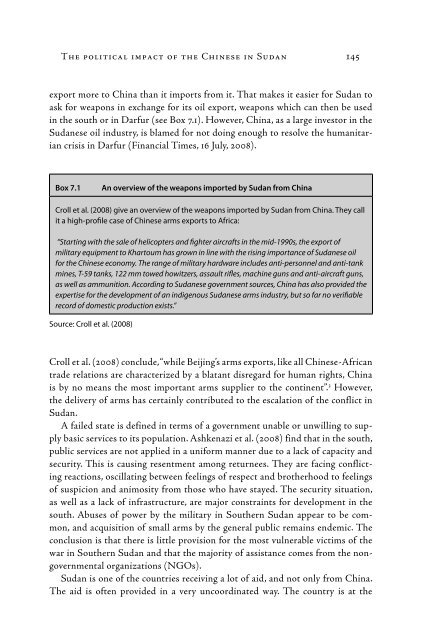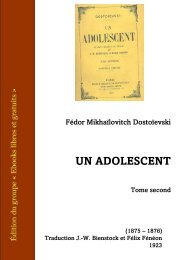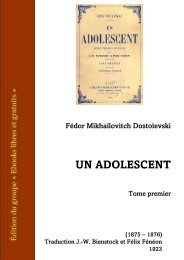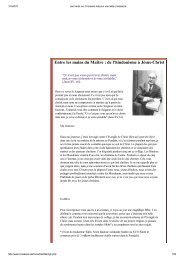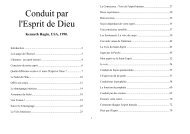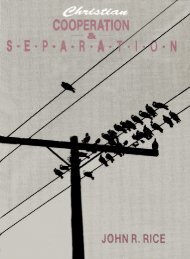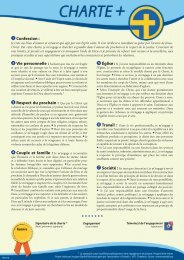The New Presence of China in Africa
Create successful ePaper yourself
Turn your PDF publications into a flip-book with our unique Google optimized e-Paper software.
<strong>The</strong> political impact <strong>of</strong> the Ch<strong>in</strong>ese <strong>in</strong> Sudan<br />
145<br />
export more to <strong>Ch<strong>in</strong>a</strong> than it imports from it. That makes it easier for Sudan to<br />
ask for weapons <strong>in</strong> exchange for its oil export, weapons which can then be used<br />
<strong>in</strong> the south or <strong>in</strong> Darfur (see Box 7.1). However, <strong>Ch<strong>in</strong>a</strong>, as a large <strong>in</strong>vestor <strong>in</strong> the<br />
Sudanese oil <strong>in</strong>dustry, is blamed for not do<strong>in</strong>g enough to resolve the humanitarian<br />
crisis <strong>in</strong> Darfur (F<strong>in</strong>ancial Times, 16 July, 2008).<br />
Box 7.1<br />
An overview <strong>of</strong> the weapons imported by Sudan from <strong>Ch<strong>in</strong>a</strong><br />
Croll et al. (2008) give an overview <strong>of</strong> the weapons imported by Sudan from <strong>Ch<strong>in</strong>a</strong> . <strong>The</strong>y call<br />
it a high-pr<strong>of</strong>ile case <strong>of</strong> Ch<strong>in</strong>ese arms exports to <strong>Africa</strong>:<br />
“Start<strong>in</strong>g with the sale <strong>of</strong> helicopters and fighter aircrafts <strong>in</strong> the mid-1990s, the export <strong>of</strong><br />
military equipment to Khartoum has grown <strong>in</strong> l<strong>in</strong>e with the ris<strong>in</strong>g importance <strong>of</strong> Sudanese oil<br />
for the Ch<strong>in</strong>ese economy. <strong>The</strong> range <strong>of</strong> military hardware <strong>in</strong>cludes anti-personnel and anti-tank<br />
m<strong>in</strong>es, T-59 tanks, 122 mm towed howitzers, assault rifles, mach<strong>in</strong>e guns and anti-aircraft guns,<br />
as well as ammunition. Accord<strong>in</strong>g to Sudanese government sources, <strong>Ch<strong>in</strong>a</strong> has also provided the<br />
expertise for the development <strong>of</strong> an <strong>in</strong>digenous Sudanese arms <strong>in</strong>dustry, but so far no verifiable<br />
record <strong>of</strong> domestic production exists.”<br />
Source: Croll et al. (2008)<br />
Croll et al. (2008) conclude, “while Beij<strong>in</strong>g ’s arms exports, like all Ch<strong>in</strong>ese-<strong>Africa</strong>n<br />
trade relations are characterized by a blatant disregard for human rights, <strong>Ch<strong>in</strong>a</strong><br />
is by no means the most important arms supplier to the cont<strong>in</strong>ent”. 3 However,<br />
the delivery <strong>of</strong> arms has certa<strong>in</strong>ly contributed to the escalation <strong>of</strong> the conflict <strong>in</strong><br />
Sudan.<br />
A failed state is def<strong>in</strong>ed <strong>in</strong> terms <strong>of</strong> a government unable or unwill<strong>in</strong>g to supply<br />
basic services to its population. Ashkenazi et al. (2008) f<strong>in</strong>d that <strong>in</strong> the south,<br />
public services are not applied <strong>in</strong> a uniform manner due to a lack <strong>of</strong> capacity and<br />
security. This is caus<strong>in</strong>g resentment among returnees. <strong>The</strong>y are fac<strong>in</strong>g conflict<strong>in</strong>g<br />
reactions, oscillat<strong>in</strong>g between feel<strong>in</strong>gs <strong>of</strong> respect and brotherhood to feel<strong>in</strong>gs<br />
<strong>of</strong> suspicion and animosity from those who have stayed. <strong>The</strong> security situation,<br />
as well as a lack <strong>of</strong> <strong>in</strong>frastructure, are major constra<strong>in</strong>ts for development <strong>in</strong> the<br />
south. Abuses <strong>of</strong> power by the military <strong>in</strong> Southern Sudan appear to be common,<br />
and acquisition <strong>of</strong> small arms by the general public rema<strong>in</strong>s endemic. <strong>The</strong><br />
conclusion is that there is little provision for the most vulnerable victims <strong>of</strong> the<br />
war <strong>in</strong> Southern Sudan and that the majority <strong>of</strong> assistance comes from the nongovernmental<br />
organizations (NGOs).<br />
Sudan is one <strong>of</strong> the countries receiv<strong>in</strong>g a lot <strong>of</strong> aid, and not only from <strong>Ch<strong>in</strong>a</strong> .<br />
<strong>The</strong> aid is <strong>of</strong>ten provided <strong>in</strong> a very uncoord<strong>in</strong>ated way. <strong>The</strong> country is at the


